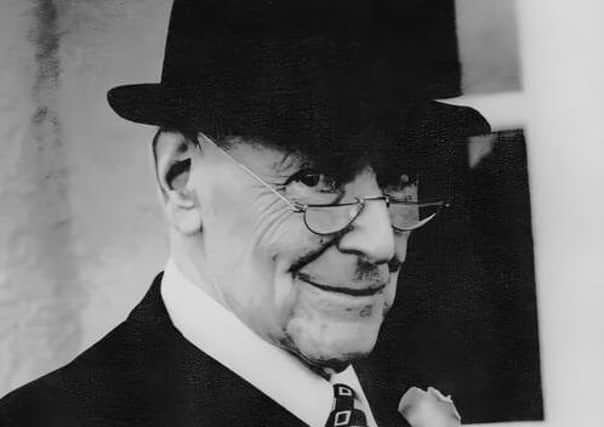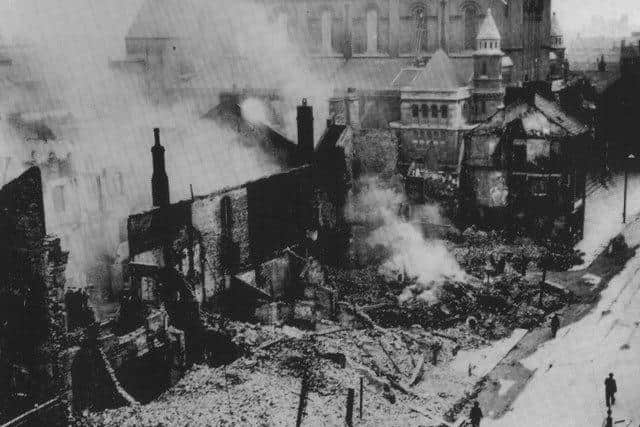Belfast Blitz minister John Clarke MacDermott and a prescient phone call to Dublin


John Clarke MacDermott was a witness to the events of Easter Monday in Dublin in 1916 and 25 years later he was minister of public security on Easter Tuesday in 1941 at the height of the Belfast Blitz.
He was the third son of the Rev John MacDermott, minister of Belmont Presbyterian Church and Moderator of the Presbyterian General Assembly in 1903, and his wife Lydia. To his friends he was John. Within his family he was Clarke. He was born on April 12 1896 and educated at Campbell College and was awarded a scholarship to Queen’s University, Belfast, in 1914.
Advertisement
Hide AdAdvertisement
Hide AdHis brother Robert Wilson MacDermott, known as Robin, was killed in action on January 8 1916 and is usually regarded as the first officer of the 36th (Ulster) Division to be killed – on the Somme – in the Great War.


In order to make a contribution to the war effort, John abandoned his studies temporarily and worked as a labourer in Workman & Clark Ltd, affectionately known as ‘the wee yard’, the smaller of Belfast’s two great shipyards.
On Easter Monday 1916, a public holiday, MacDermott and his friend Robert Orchard, the son of Wallace Orchard, a manager of a timber business, decided to visit in Dublin which neither of them had visited before. As a result MacDermott and his friend witnessed the outbreak of the Easter rebellion.
As the focus here is on J C MacDermott as minister of public security on Easter Tuesday in 1941, the detail of his visit to Dublin is for another day. His memoir entitled ‘An Enriching Life’ provides a fascinating account of those events and the story of the return trip to Belfast but unfortunately does not extend to the Blitz.
Advertisement
Hide AdAdvertisement
Hide AdBefore the end of the year (1916) MacDermott volunteered for service in the Great War, serving in the machine gun battalion of the 51st Highland Division. He saw action in the second Battle of the Marne and won the Military Cross.
He was a member of the post-war British army of occupation in Germany before he was demobilised in the spring of 1919.
He returned to his studies and graduated with a First in Law in 1921 and won the Dunbar Barton prize (as his brother Robin had done). He won the Victoria prize and exhibition at King’s Inn, Dublin, and obtained first-class honours in his final examination.
He was called to both the Irish and Northern Ireland Bar in 1921. Between 1932 and 1936 he lectured in Jurisprudence at QUB and between 1929 and 1938 he was determiner of Industrial Assurance Disputes. He took silk in 1936.
Advertisement
Hide AdAdvertisement
Hide AdIn 1938 he was elected to the Northern Ireland House of Commons (as one of the four MPs for Queen’s University). Privately, he was a critic of Neville Chamberlain’s policy of appeasement (which the Unionist Party supported).
The Munich Agreement of September 30 1938 (which dismembered Czechoslovakia) left him ‘greatly depressed’. He believed – correctly – that Nazi Germany’s demands were insatiable and that another onslaught from Hitler ‘seemed inevitable’.
With the approach of the Second World War, he volunteered for the Army in August 1939 and served in the Royal Artillery. After the evacuation of Dunkirk he was released from military service at the request of the Northern Ireland government and became minister of public security from June 25 1940 to November 10 1941.
German possession of the seaboard of western Europe from the Arctic Circle to the Bay of Biscay brought Belfast within the range of German bombers.
Advertisement
Hide AdAdvertisement
Hide AdBoth London and Belfast were slow to adjust to this new and important fact. From his first day in office he was convinced that Belfast would become a target of the Luftwaffe and was appalled to discover that the Ministry of Home Affairs had been returning fire-fighting equipment to Britain on the assumption that it would not be needed.
In March 1941 MacDermott requested – in vain – more guns, searchlights and night fighters, predicting that ‘the period of the next full moon from, say, April 7-16 may well be our turn’
And so it proved to be because the first German raid came on the night of April 7 but was a minor affair compared to the massive raid on Easter Tuesday. Nevertheless it still caused 13 deaths.
On Easter Tuesday (April 15) some 180 German bombers launched a five-hour assault on Belfast, resulting in the deaths of 900 men, women and children. Approximately 55,000 houses were damaged, leaving some 100,000 people temporarily homeless.
Advertisement
Hide AdAdvertisement
Hide AdAs MacDermott had feared, the massive bombing played havoc with the water mains. There were 32 fractures in all, and the water pressure fell to 50% of normal at exactly the wrong time. MacDermott realised that he needed assistance on an impressive scale.
Almost exactly 25 years after his visit to Dublin in 1916, at around 1.30 am on April 16 1941 (the Wednesday after Easter) MacDermott took the unprecedented step of ringing Dublin, asking to speak to ‘someone in authority’ and requesting that fire appliances be sent across the border as quickly as possible. Eamon de Valera was woken at 2am and, taking ‘what was possibly the fastest decision of his career’, ordered Irish fire brigades north to render assistance to Belfast’s hard-pressed firefighters. Thirteen appliances in all – from Dublin, Dun Laoghaire, Drogheda and Dundalk – hurtled north.
MacDermott made his telephone call just in time. At 1.45 am a massive explosion put Belfast’s central telephone exchange out of action, severing all local and trunk lines out of Belfast.
On April 22 1941 in the Northern Ireland House of Commons MacDermott paid tribute to the assistance received from the South: ‘The help received from our neighbour, Eire, was not related to any bond of war or any political consideration and was above and beyond politics. It was based on common humanity; we gratefully accept and acknowledge it as such.’
Few, if any, Northern Ireland politicians emerged from the Belfast Blitz more creditably than J C MacDermott.